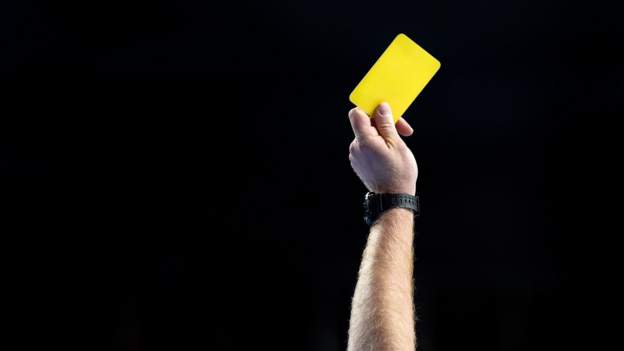Football sin-bins: Ex-rugby referee Nigel Owens warns players of sin-bin 'culture shock'
Written by I Dig Sports
Former international rugby referee Nigel Owens has warned professional footballers face "a huge cultural change and shock" if sin-bin proposals succeed.
Owens has backed the trial plans to introduce sin-bins in professional football for dissent and cynical fouls.
The plans mirror the 10-minute sin-bins in rugby union and Owens says it would give officials "an extra tool".
However, he also says there will be "inconsistencies" to contend with.
The game's law-making body, the International Football Association Board (Ifab), said it will "identify which levels are best to test".
The trial will also include a rule allowing only the team captain to approach the referee during a game.
Sin-bins have been trialled at grassroots level since 2019.
If adopted, the proposals would apply to both both men's and women's football.
Owens, who refereed 100 Test matches before his 2020 retirement, says bringing in sin-bins in football is "something positive because it gives the referee an extra tool really, in dealing with cynical foul play or dissent, in particular".
He told BBC Radio Wales: "The problem you will have is when you introduce something new like this, it can open things up to maybe sometimes inconsistencies around the decisions that are made.
"But that's something as a group of officials - and these are professional, high quality officials who are at this level - they hopefully will be able then to make good decisions and come collectively to be as consistent as they as they can around it.
Owens, who refereed the 2015 World Cup final, says dissent is "creeping into rugby as well" and believes "culture in society" is the cause.
Rugby players who earn referees' ire can prompt penalty decisions being reversed and "tends to mean that the players will stop surrounding the referees".
The oval-game's captains have the role of liaising with referees and can ask for clarification on why decisions have been made.
Ifab's plans also include only captains speaking to referees on the pitch.
"Now in football that is going to be a bigger challenge, but I certainly think again this is something that will benefit the game," said Owens.
"I'm not an avid football supporter, but I enjoy watching and I think everybody, even the most ardent football supporter, will say that surrounding the referees, everybody questioning decisions, everybody running around him, is not needed in the sport.
He added: "That will probably take a little bit more hard work to get players to change their behaviour because they're used to doing it and it's going to be a huge cultural change and shock for them."
'Vile abuse' must be dealt with
Owens also backed 2023 World Cup final referee Wayne Barnes' call for those indulging in "over the line" social media abuse to be held to account.
Barnes' television match official colleague Tom Foley has also revealed similar experiences.
Owens said: "It is vile and it is very sad. It is the society we live in. That doesn't make it right whatsoever.
"The problem you have with the introduction of social media, this is very difficult now because it's outside of rugby's control.
"If you have a player or a coach who is active in the game, or if you have a club committee member or your local grassroots rugby supporters, you know abusing the referees - which crosses that line of what is acceptable or not - the rugby authorities are able to deal with it.
"The problem you have on social media [is there are] people hiding behind a fake name, a fake profile. They could be somebody who has no affiliation to any rugby club or rugby organisation at all.
"It's very difficult for rugby to deal with that. It then becomes an issue where social media and governments need to put things in place to deal with these type of vile actions to be able to identify these individuals and deal with it.
"I had death threats in 2011 World Cup and I've had letters since, sent to my home here.
"It's the world we live in. It's not nice, but something needs to be done. What exactly can we do about it? That is that is the challenge, I believe."















 Phone: (800) 737. 6040
Phone: (800) 737. 6040 Fax: (800) 825 5558
Fax: (800) 825 5558 Website:
Website:  Email:
Email: 






